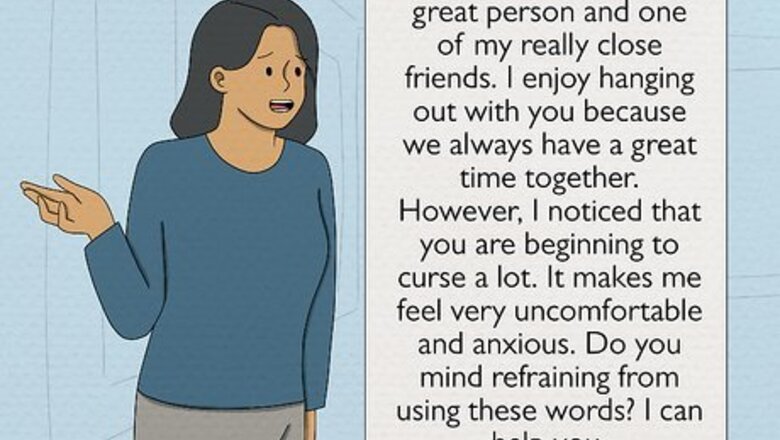
views
Expressing Your Concern
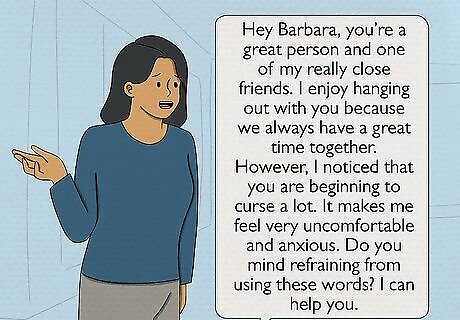
Let them know you are uncomfortable. Tell your friend that you are uncomfortable every time they use a curse word or a succession of curse words. Make sure to let your friend know that you do not have a problem with them, but with their excessive cursing. Preface the conversation with a positive tone by saying something positive first. You can say, “Hey Barbara, you’re a great person and one of my really close friends. I enjoy hanging out with you because we always have a great time together. However, I noticed that you are beginning to curse a lot. It makes me feel very uncomfortable and anxious. Do you mind refraining from using these words? I can help you.”
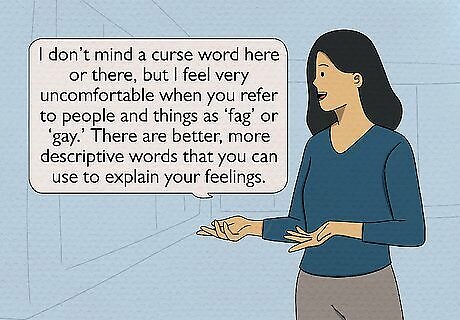
Set boundaries. Perhaps you are uncomfortable with a specific curse word, for example curse words relating to someone’s gender or race. Let your friend know that you will not tolerate the use of these words around you. Don’t alienate your friend by avoiding them completely. However, let them know that you lose any interest in what they are saying once they start using these words. For example, “I don’t mind a curse word here or there, but I feel very uncomfortable when you refer to people and things as ‘fag’ or ‘gay.’ There are better, more descriptive words that you can use to explain your feelings.”

Help them make a commitment. Let your friend know that you are willing to help them make a commitment to stop cursing or using specific curse words. Help them make a commitment by setting a goal. Let them know that you will help them achieve this goal as long as they are willing to commit to it. For example, if your friend curses at least five times a day, set a goal to reduce the amount of curse words used to once per day. Once this goal is achieved, set a new goal of four curse words per week. Keep going until the use of curse words is eliminated from their vocabulary.
Help your friend find motivation to stop swearing. To stop any sort of behavior, there needs to be a motivation within the person for that change to happen. You might remind them how breaking a cursing habit can: Help them look more professional in their future career Set a better example for younger children around them (e.g., a younger sibling) Be viewed as more respectful by the people around you
Changing the Behavior

Use a swear jar. A minor punishment, like a swear jar, can help curb your friend’s cursing. When engaging in minor punishments, like a swear jar, both you and your friend should participate. By participating, you are showing your support. With your friend, make a pact that you will both carry around a small jar or pot. Every time you use a curse word, donate a penny or a nickel to the jar. At the end of the day, you can compare who has more money in the jar.
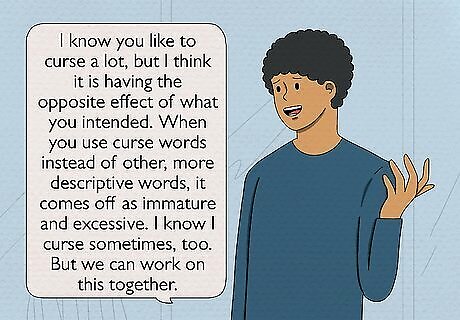
Talk with your friend. People use profanity for a variety of reasons. Some common reasons are that they think swearing makes them look more mature, impressive, or respected in front of their peers. Explain to your friend that using profanity can actually have the opposite effect. It can turn people off, as well as give an impression of immaturity. You can tell your friend, "I know you like to curse a lot, but I think it is having the opposite effect of what you intended. When you use curse words instead of other, more descriptive words, it comes off as immature and excessive. I know I curse sometimes, too. But we can work on this together."

Take your friend out. If you notice your friend making progress, then recognize their effort. Offer to take them out to coffee, ice cream, or the movies. This will encourage your friend to keep improving. It will also show your friend that you support them and want the best for them. You can say, "I noticed that you stopped cursing so much. I am really impressed. It takes a lot of effort to change bad habits, especially cursing. Let me take you out to coffee."
Addressing the Issue
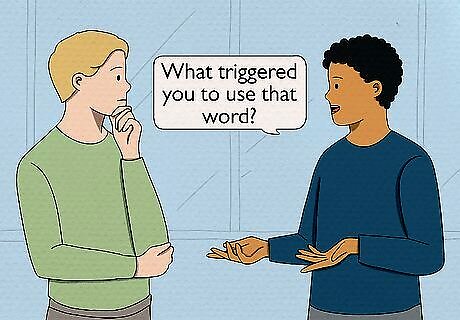
Identify the triggers. There are people and situations that can trigger the use of profanity. Long lines, traffic jams, people they dislike, and people or things that also use profanity in a casual manner can trigger the behavior. Once they become aware of these triggers, they will be able to control their behavior better. You can ask them, “What triggered you to use that word?” Help them eliminate music, movies, or TV shows that use excessive profanity.
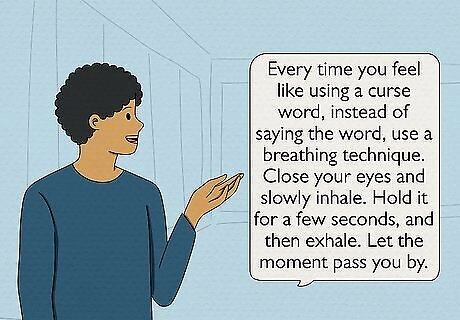
Advise your friend to calm down. Pent up anger can also cause your friend to use profanity excessively. Help your friend divert their anger by advising them to use breathing techniques whenever they feel the urge to express their frustration with profanity. Tell your friend, “Every time you feel like using a curse word, instead of saying the word, use a breathing technique. Close your eyes and slowly inhale. Hold it for a few seconds, and then exhale. Let the moment pass you by.” Exercise can also relieve pent up anger and frustration. Offer to go biking or running in the park whenever your friend expresses anger and frustration.

Help them find substitutes. Curb their use of curse words by helping them find healthy substitutes. You can either help them expand their vocabulary, or offer more benign substitutes for the curse word. Help them look up substitute words in the dictionary that more accurately describe how they are feeling. Help them come up with substitute phrases. For example, tell them to say, “Oh shitake mushrooms,” instead of “Oh shit.”


















Comments
0 comment